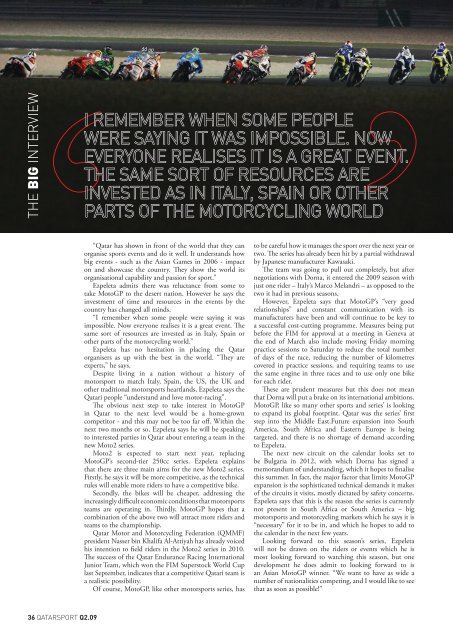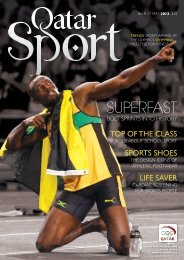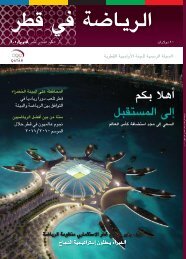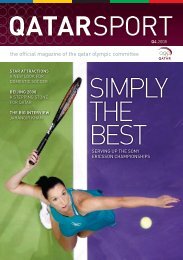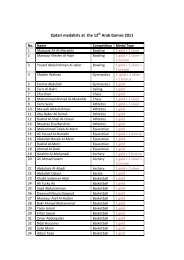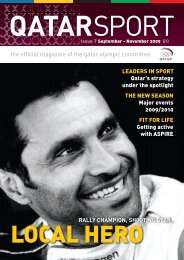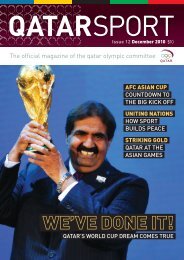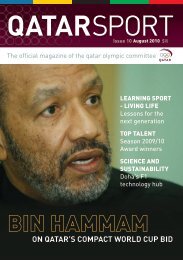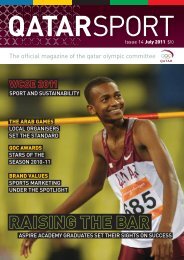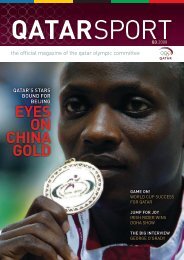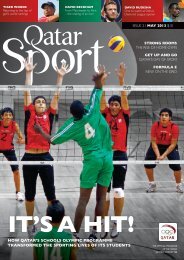NEWS - Qatar Olympic Committee
NEWS - Qatar Olympic Committee
NEWS - Qatar Olympic Committee
Create successful ePaper yourself
Turn your PDF publications into a flip-book with our unique Google optimized e-Paper software.
“”<br />
the big interview<br />
I remember when some people<br />
were saying it was impossible. Now<br />
everyone realises it is a great event.<br />
The same sort of resources are<br />
invested as in Italy, Spain or other<br />
parts of the motorcycling world<br />
“<strong>Qatar</strong> has shown in front of the world that they can<br />
organise sports events and do it well. It understands how<br />
big events - such as the Asian Games in 2006 - impact<br />
on and showcase the country. They show the world its<br />
organisational capability and passion for sport.”<br />
Ezpeleta admits there was reluctance from some to<br />
take MotoGP to the desert nation. However he says the<br />
investment of time and resources in the events by the<br />
country has changed all minds.<br />
“I remember when some people were saying it was<br />
impossible. Now everyone realises it is a great event. The<br />
same sort of resources are invested as in Italy, Spain or<br />
other parts of the motorcycling world.”<br />
Ezpeleta has no hesitation in placing the <strong>Qatar</strong><br />
organisers as up with the best in the world. “They are<br />
experts,” he says.<br />
Despite living in a nation without a history of<br />
motorsport to match Italy, Spain, the US, the UK and<br />
other traditional motorsports heartlands, Ezpeleta says the<br />
<strong>Qatar</strong>i people “understand and love motor-racing”.<br />
The obvious next step to take interest in MotoGP<br />
in <strong>Qatar</strong> to the next level would be a home-grown<br />
competitor - and this may not be too far off. Within the<br />
next two months or so, Ezpeleta says he will be speaking<br />
to interested parties in <strong>Qatar</strong> about entering a team in the<br />
new Moto2 series.<br />
Moto2 is expected to start next year, replacing<br />
MotoGP’s second-tier 250cc series. Ezpeleta explains<br />
that there are three main aims for the new Moto2 series.<br />
Firstly, he says it will be more competitive, as the technical<br />
rules will enable more riders to have a competitive bike.<br />
Secondly, the bikes will be cheaper, addressing the<br />
increasingly difficult economic conditions that motorsports<br />
teams are operating in. Thirdly, MotoGP hopes that a<br />
combination of the above two will attract more riders and<br />
teams to the championship.<br />
<strong>Qatar</strong> Motor and Motorcycling Federation (QMMF)<br />
president Nasser bin Khalifa Al-Attiyah has already voiced<br />
his intention to field riders in the Moto2 series in 2010.<br />
The success of the <strong>Qatar</strong> Endurance Racing International<br />
Junior Team, which won the FIM Superstock World Cup<br />
last September, indicates that a competitive <strong>Qatar</strong>i team is<br />
a realistic possibility.<br />
Of course, MotoGP, like other motorsports series, has<br />
to be careful how it manages the sport over the next year or<br />
two. The series has already been hit by a partial withdrawal<br />
by Japanese manufacturer Kawasaki.<br />
The team was going to pull out completely, but after<br />
negotiations with Dorna, it entered the 2009 season with<br />
just one rider – Italy’s Marco Melandri – as opposed to the<br />
two it had in previous seasons.<br />
However, Ezpeleta says that MotoGP’s “very good<br />
relationships” and constant communication with its<br />
manufacturers have been and will continue to be key to<br />
a successful cost-cutting programme. Measures being put<br />
before the FIM for approval at a meeting in Geneva at<br />
the end of March also include moving Friday morning<br />
practice sessions to Saturday to reduce the total number<br />
of days of the race, reducing the number of kilometres<br />
covered in practice sessions, and requiring teams to use<br />
the same engine in three races and to use only one bike<br />
for each rider.<br />
These are prudent measures but this does not mean<br />
that Dorna will put a brake on its international ambitions.<br />
MotoGP, like so many other sports and series’ is looking<br />
to expand its global footprint. <strong>Qatar</strong> was the series’ first<br />
step into the Middle East.Future expansion into South<br />
America, South Africa and Eastern Europe is being<br />
targeted, and there is no shortage of demand according<br />
to Ezpeleta.<br />
The next new circuit on the calendar looks set to<br />
be Bulgaria in 2012, with which Dorna has signed a<br />
memorandum of understanding, which it hopes to finalise<br />
this summer. In fact, the major factor that limits MotoGP<br />
expansion is the sophisticated technical demands it makes<br />
of the circuits it visits, mostly dictated by safety concerns.<br />
Ezpeleta says that this is the reason the series is currently<br />
not present in South Africa or South America – big<br />
motorsports and motorcycling markets which he says it is<br />
“necessary” for it to be in, and which he hopes to add to<br />
the calendar in the next few years.<br />
Looking forward to this season’s series, Ezpeleta<br />
will not be drawn on the riders or events which he is<br />
most looking forward to watching this season, but one<br />
development he does admit to looking forward to is<br />
an Asian MotoGP winner. “We want to have as wide a<br />
number of nationalities competing, and I would like to see<br />
that as soon as possible!”<br />
36 <strong>Qatar</strong>Sport Q2.09


